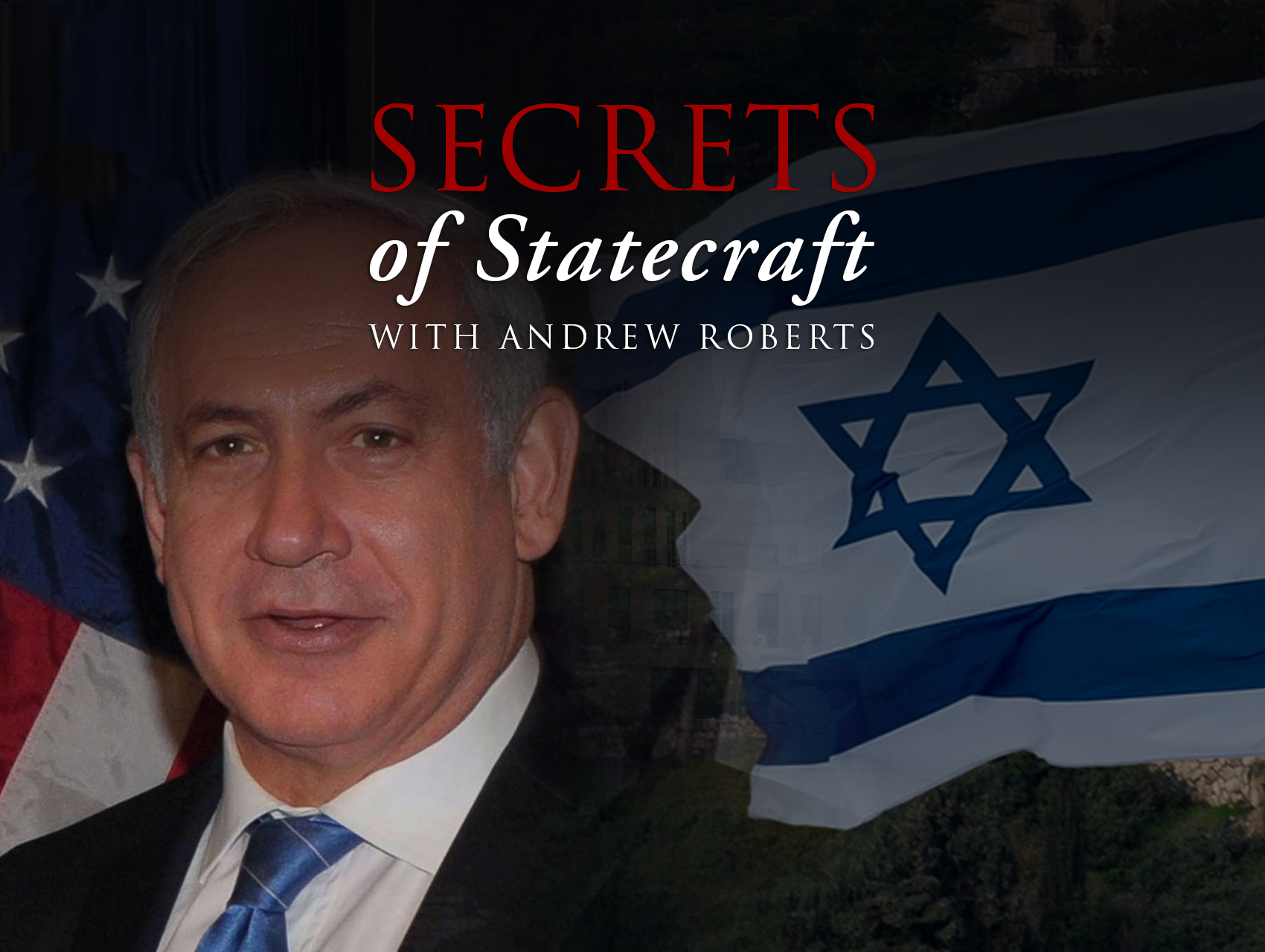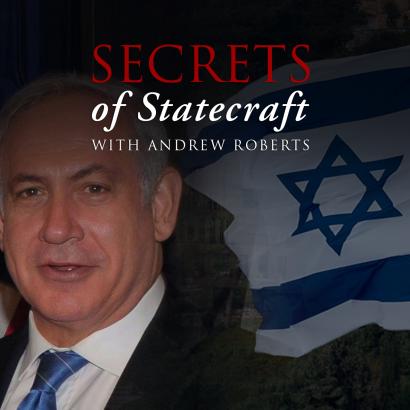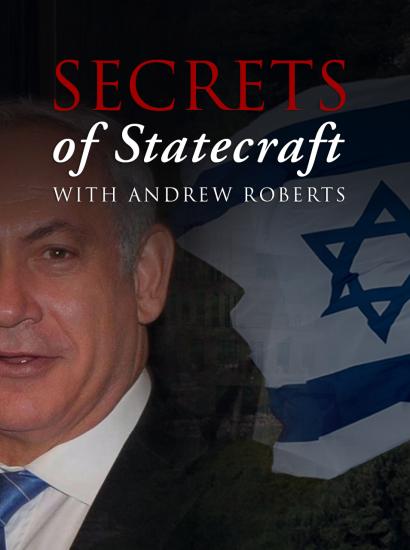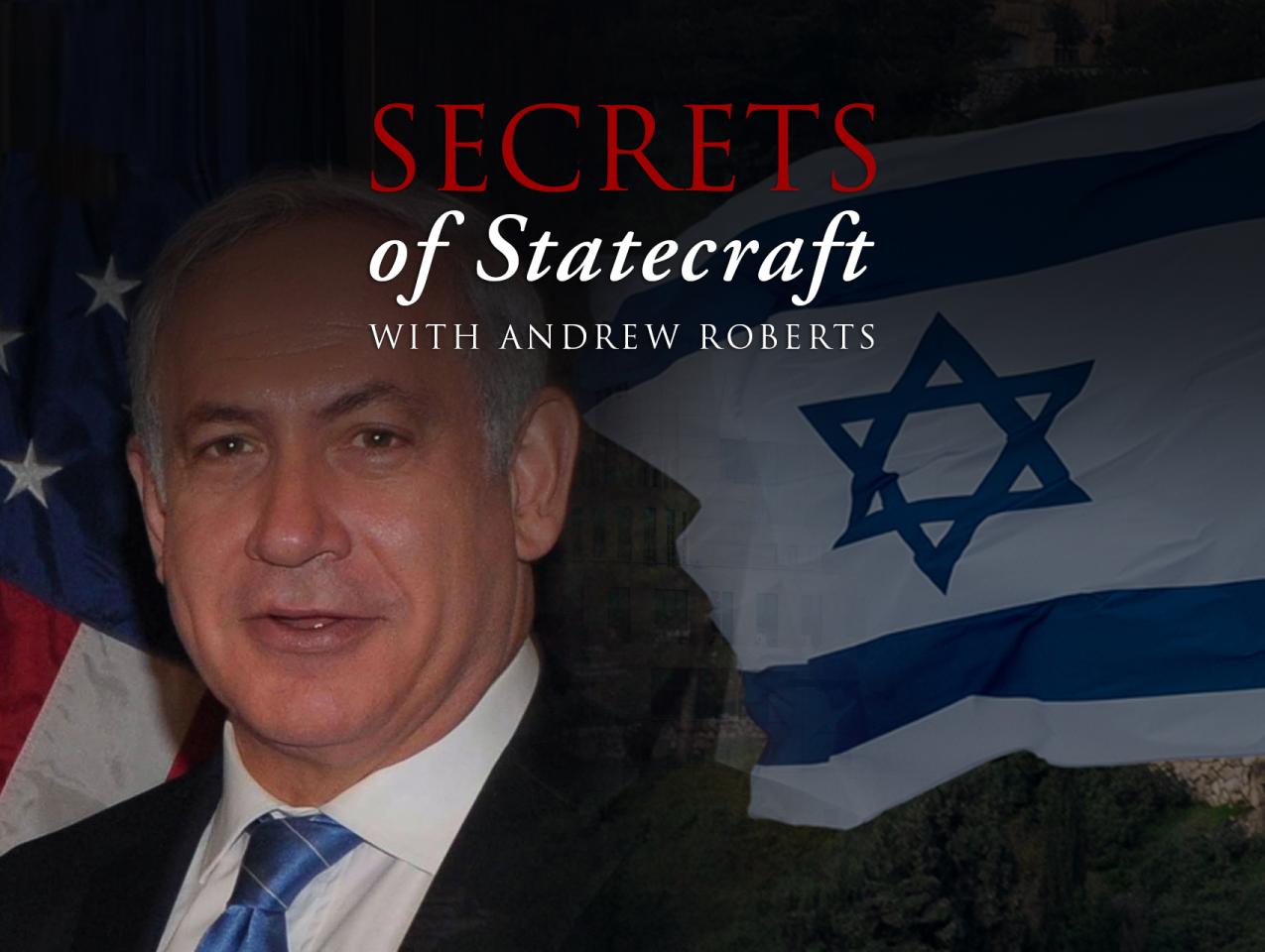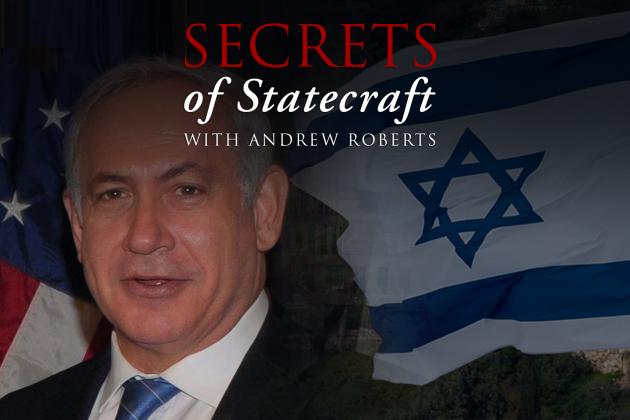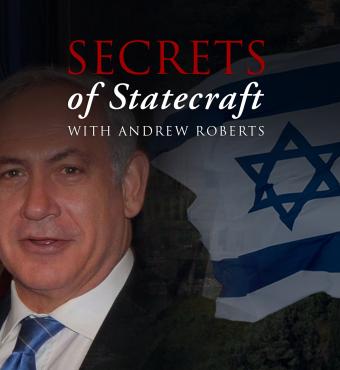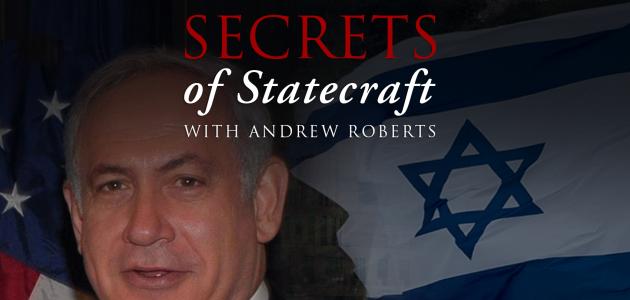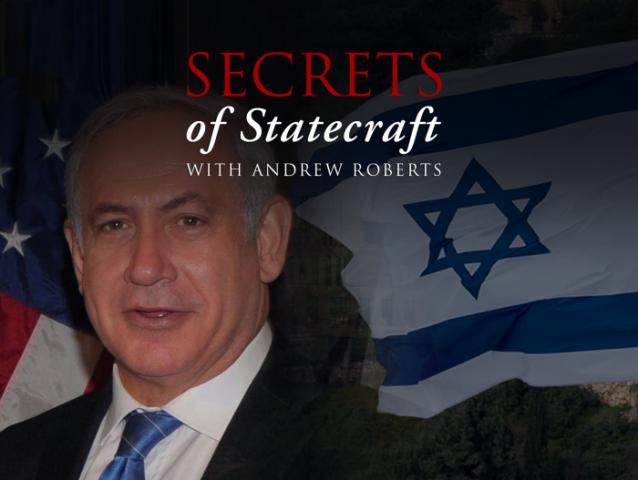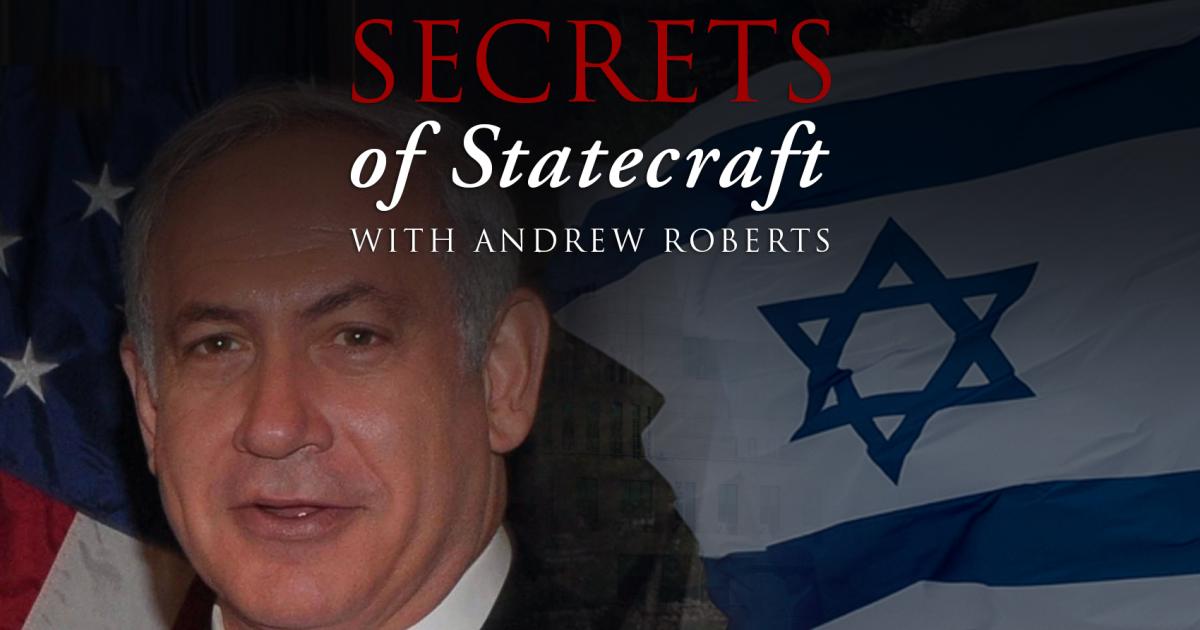- Middle East
- History
- Economic
- Military
- World
- Values & Social Policy
- Values
Bibi Netanyahu grew up in a household in which historical discussion and debate was constant, as his father was a distinguished professional historian. Here he discusses what effect the past has had on his life and career.
To view the full transcript of this episode, read below:
Andrew Roberts: Benjamin Disraeli used to say that he was born in a library because his father, Isaac, was a famous writer and intellectual. To what extent was that true of you, too, Mr. Netanyahu, because your father, Benzion, was an historian, the editor of the Encyclopedia Hebraica, a professor at Cornell, and, of course, the author of a groundbreaking book on the origins of the Spanish Inquisition? What affect did your father have on your understanding of history and especially Jewish history?
PM Benjamin Netanyahu: Enormous. Obviously Israeli grew up in a library. I grew up in a historians' library. First of all, we were surrounded by books and I was surrounded by my father. I found, many years afterwards when I visited my childhood home, boxes with notebooks from fifth grade and they were history notebooks from my classes in history. We studied history. And they were learned essays in there written in a child's handwriting. And clearly there were dictated by him, but it was a stellar influence. And I think it shaped much of my thinking, because he was so... powerfully was a very original thinker. He was totally fearless in checking facts and taking him where the facts would lead him.
PM Benjamin Netanyahu: But he had a totally independent mind and his understanding of history, not only Jewish history, but general history, was something that he communicated to me and it shaped my thinking. It also shaped my mission. There is no point in being in politics, as far as I'm concerned, in order to sit there. You are either charged with an historical mission or you're not. I was, and still am. And it's largely due from his influence, without a question.
Andrew Roberts: And he said that he told you that education was the greatest prerequisite for a leader, didn't he? I mean, do you think that's true... that courage presumably must also be another one?
PM Benjamin Netanyahu: Well, no, I asked him before I became prime minister. First of all, you have to understand, we never discussed politics at home. We discussed history... a lot. We never discussed politics, maybe with one exception, one conversation, but we never discussed day to day politics. It just didn't enter the conversation. Neither when I was a child, though, much later as an adult, he just didn't deal with that. But we did discuss historical currents, historical events, world events, a great deal. But before I became prime minister, I asked him, what do you think is the prerequisite quality for being a prime minister of Israel? That was my question. And he answered that, what do you think? And I said, well, you have to have a vision. You have to have a commitment to that vision. You have to have also the flexibility to navigate your way through the various obstacles in order to achieve your vision.
PM Benjamin Netanyahu: He said, well, that's true of anything. He said, it's true of a university professor. It's true in many ways of a military commander. It's true of a business leader. There is something else that is required for being the prime minister of Israel. And I said, what? And then he said, this word that astounded me. He said, education. You need a very deep and broad education, otherwise, he said, you'll be at the mercy of your clerks. And that is a, I would say, a very penetrating and true statement, which I found to be true every day of my 15 years in service as Israel's prime minister... every day.
Andrew Roberts: Let's talk about your education. Other than your father, did you have any charismatic history teachers during your schooling, because it couldn't have been very easy being your history teacher, knowing that your father was one of Israel's most distinguished scholars.
PM Benjamin Netanyahu: I had good ones. I don't remember any ones that deeply inspired me, but I read books from a very young age that deeply inspired me. Perhaps the ones that made the greatest impression on me in my youth, and still do today is, Will Durant's Story of Civilization, which I read. It's voluminous, it's 11 volumes. I read a great deal of it and his summations, his wonderful books... he was a wonderful historian and a wonderful writer. So that definitely had an impact on me. And there are others, obviously, but these books... I was steeped in Jewish history, but only... but because of my father's influence, always looking at it in the broader context of general history, the rise and fall of empires, the stitches of time that we could find to advanced the cause of Jewish independence and the places where we failed, not realizing the geopolitical historical events that were taking place around us. That is something that I was raised from childhood with.
Andrew Roberts: And do you think mankind learns these lessons? Do we learn from the past? Have you seen evidence in the great world events that you've witnessed in your own career?
PM Benjamin Netanyahu: That's not clear. That's a continuously debated question in my mind... did we learn from it. Well, given the way that we're dealing with the threat from Iran, that is this malignant force that could bring nuclear weapons to a theological dictatorship, I would say it doesn't look like we've learned anything from it. I think that we think we do, but we're constantly put to the test. The jury is always out on this question.
PM Benjamin Netanyahu: I would say it's... Martin Luther King's observation that the arc of history tends towards the positive, right? Well, yes and no. It's not at all clear. There are technological advances, there are advances in the humankind. I read... I think it's this Harvard scholar, Pinker, who says that we're all the time advancing because the level of violence is decreasing. The level of mortality is decreasing and so on, but also the level of potential destruction is increasing. And it's not clear that we gleaned the lessons that are necessary. It is a fact that... people think, well, humanity is moving forward because the better angels of our nature are will secure us. Well, when Lincoln said that, he had just crushed the Confederacy... or was about to crush the Confederacy and to abolish slavery with the force of arms. It wasn't because there were better angels of the nature of the Confederacy, right?
Andrew Roberts: No. And also the Steven Pinker theory that you're referring to, it could change in an afternoon, couldn't it? There is an arc, but it might... it wouldn't take much, as you mentioned, the Iranians, just suddenly to-
PM Benjamin Netanyahu: If there is, it is quite brittle. It's a brittle arc.
Andrew Roberts: That's right. Yes.
PM Benjamin Netanyahu: And I would say... look, I would think that there is a constant battle between the forces of modernity and the forces of medievalism. That's what we face today in the Middle East facing militant Islam. Facing militant Islam is only not only Israel, but many of our Arab neighbors will understand that their future also could be compromised and endangered and crushed by these forces that hark back to a very dark past. So I would say that you can continue to move the arc forward... the arch forward, if you have the necessary will and power to protect civilization and to nurture it, but it could easily be wiped away by larger forces. We used to think that... and this is a common theory, I've read many books on this... I mean, Victor David Hanson has written that, well, we have an innate advantage, that democracies have an advantage because of the freedom and initiative.
PM Benjamin Netanyahu: We invent things, we invent better weapons, and we have the initiative of commanders and soldiers and so on. And therefore we should... we always triumph. I hope so, but it's not obvious. Here you have an ant hill economy in North Korea. It's about 5 to 10% of Israel's GDP, even though their population is many times over ours. And they're manufacturing ICBMs. They're manufacturing nuclear weapons. They're probably manufacturing hypersonic missiles, too. So it is not clear, at all, that the future of civilization is automatically, as I know it... free civilization, creative civilization, the ones that enshrine the freedoms that make life worth living, it's not obvious that these... that this civilization has a guaranteed future or guaranteed victory. It's not true.
Andrew Roberts: And this naturally brings us on to Winston Churchill, of whom you are a great admirer. What is it about his life and career that's inspired you over the years?
PM Benjamin Netanyahu: Well, just that. The resolution. The resolution to protect our free civilizations... by the way, Churchill's worldview as I see it, was not simply that he was belonging to the British empire, was a 19th century example of a patriot of the British empire. I think it was more than that. I think his was a civilizational... he had a civilizational view. At least I read that in... I think in your book, among many others.
Andrew Roberts: Thank you for the free plug there, Bibi.
PM Benjamin Netanyahu: It was. It's an excellent... I'm giving you a plug and you didn't ask me to do that, but it's an excellent biography. But that wasn't enough. He was willing to muster the forces, his own personal forces, and the forces of the British people, and to an extent, the free world to protect those freedoms. That's what I admire about him. And he did so at considerable personal cost, which he was willing to bear.
Andrew Roberts: Let's move on to another hero of yours, Aaron Aaronsohn.
PM Benjamin Netanyahu: Let me just tell about Churchill, there's a question that I always raise in my mind and people say, well, he saved the world. In many ways, he did, but now comes the problem. Suppose he hadn't? Suppose he hadn't? And it's the what ifs that... I think that people always ask, and maybe you were asking.
Andrew Roberts: I'm going to ask you one later and say where-
PM Benjamin Netanyahu: Well, I'll give you a what if right now about Churchill... suppose he hadn't? Suppose he failed? Would we have lost? Would we have entered a 1000 years of darkness? And the answer is, I don't think so, because when you look at where the Germans were on their nuclear program, and it's very clear from those tapes of the German scientists after which, were sitting in whatever, in this compound in Britain, that they didn't have a clue. They were on the wrong side. So if you compare that to the Manhattan Project, they were on the right path. So if the United States would've developed nuclear weapons, yes, all of Europe and Britain would've been conquered, but Germany didn't stand a chance. The counter argument to that you could raise it, would be that if Churchill hadn't put up a stand, would America have felt compelled to develop the Los Alamos, and would they have done these things? So probably you can't answer that.
Andrew Roberts: But well, if we're going down that rat... if we're going down that-
PM Benjamin Netanyahu: Well, what do you think?
Andrew Roberts: Well, I mean, two other things about that would be of course, first of all, that an awful lot of the scientists that did make the breakthroughs at Los Alamos were British and Europeans, who, had they been captured, by Hitler.
PM Benjamin Netanyahu: I'm going to challenge that. I think they were Hungarian Jews mostly.
Andrew Roberts: Yeah. Alright. But a Hitler victory doesn't mean that you get as many Hungarian Jews or even the Danish scientists of various people who are necessary, but as you say... and the other thing as you say, is that it required billions upon billions to be poured into that project, which might not have happened if America had come to some kind of a deal with Hitler after the fall of Europe.
PM Benjamin Netanyahu: Yeah. I don't think this in any way diminishes Churchill as stark importance... mind you, I think it was crucial, but I ask myself the question and the what ifs are never answered, you never know.
Andrew Roberts: Let's move on to Aaron Aaronsohn, because not much is known about him in Britain, or in the United States, I would say, but he is a hero of yours and fully deserves to be. Tell us about him and what you admire about him.
PM Benjamin Netanyahu: Well, Aaron Aaronsohn was a brilliant agronomist, a brilliant scientist, who at the age of 32 discovered the mother of wheat, which has fed countless millions in the world, since then. He was so admired that when he visited the United States, everybody, literally everybody, carried him on their shoulders... when he was young man. When the Ottomans entered the war, WWI, he immediately saw the great opportunity to have the Ottoman empire defeated. And he understood that the rise of Israel could only come, if the Ottomans were defeated. They were there for 400 years occupying our ancestral homeland, and they could be there another 400 years. He said, this is the opportunity to oust them. And he wanted to help the British in kicking them out from, what was then, Palestine. So he set up a spy ring of 30 very brave people who fed information to the British command in Egypt... to Allenby's command.
PM Benjamin Netanyahu: And it helped them conquer the country. Allenby later said, and many of his officers said, that he was the most valuable spy, agent, that they had in the Middle East, and perhaps during the entire war. He really did extraordinary things. For example, he went to the Turkish governor, and he said... because he was so famous, he said, I'll help you with this locusts, the swarming locust bands... the locust plague that was just sweeping the country. And he said, of course, locust don't recognize the boundaries of military bases. So my men will have to go in there to make all their exams and so on. So he fed the British invaluable information and told them that the attack route that they should have, was not through Gaza, which failed twice with horrendous costs, but through Beersheba.
PM Benjamin Netanyahu: And in many ways that helped, helped the conquest, which later indeed, threw the Ottomans out of the country. He also, along with Weizmann, helped to advance the Balfour Declaration, which was the beginning of a document that led to the recognition of Zionism and the idea of a Jewish national home, and later, a state where Israel is right now. He was sitting in the other room with Chaim Weizmann when Mark Sykes, who was part of that commission that drafted the Balfour Declaration, burst into the room and he said, it's a boy. It's been delivered. Well, sitting right next to Chaim Weizmann was Aaron Aaronsohn, so he was exceptionally important and exceptionally influential. The reason I think about him is not only because of his crucial role in helping liberate our homeland from Turkish rule, but I think also because he was the one person that I believe could have broken British policy that soon turned against us and shut the gates of our homeland and basically trapped 6 million Jews in the oven that was Europe.
PM Benjamin Netanyahu: We couldn't get them out. And unfortunately he died in a plane crash over the English channel in 1920. So he wasn't available in the interwar years to help break that policy, which I think he would've done in the United States, because I think he would've realized what my father had realized, that the only place to change British policy was not in Britain, but actually in America, the rising power in the world. So why do I believe he was so powerful? Because he had an extraordinary intellect... he must have read about 30,000 books. There is an American diplomat called William Bullitt. William Bullitt was a personal assistant of Woodrow Wilson. And then of FDR. FDR appointed him as the first American ambassador in Moscow. So you understand how important he was. He was personally involved with Churchill, with DeGaulle, and with Stalin. And Bullitt wrote after Aaronsohn's death, that Aaronsohn was the most impressive figure he ever met. Now let's face it. He met some impressive figures.
Andrew Roberts: You can say that again.
PM Benjamin Netanyahu: He worked with two American presidents. He met other historical figures, one of which we just discussed. And yet William Bullitt says that Aaronsohn was the most impressive person he ever met. In fact, 20 years after his death, in 1940 he visited what is now Israel. And he went especially to the north of Israel to Atlit, to visit Aronsohn's grave. So I think we lost here an enormous figure because our problem was in the interwar years that we couldn't break the gates of Europe, the gates to our land and save millions of Jews. And I think Aaronsohn, would've been the indispensable figure. So some people... in fact who could have done this... I believe some people are indispensable and Aaronsohn was one of them.
Andrew Roberts: And yet he's not at all as well known as someone like Lawrence of Arabia, at least in this country. What's your view of the long term legacy of T. E. Lawrence?
PM Benjamin Netanyahu: Well, I think Lawrence was very fortunate to have Lowell Thomas, who gave him a tremendous buildup. Look, Lawrence was an intriguing figure. He was obviously an intellectual statesman. He understood the opportunities to drive a wedge between the Arabs and the Turks. And he did it in his own way. I think that his own contribution has been magnified because of the dramatizations... the play that Thomas put on, and then the film, an excellent film, I think, that David Lean did, but if you actually examined it historically as my father would and you would, I think, and I, in my own amateurish way, I think Lawrence had... I think he understood the Arab world perfectly.
PM Benjamin Netanyahu: I think Seven Pillars of Wisdom... if you read it carefully, is quite precise in many ways, but he was also part showman. So I think he magnified his own contribution. And I think in many ways, if you ask me who was more important, I think Aaronsohn was more important because he gave the strategic path that broke the Ottoman rule. And I think the raids on the Hejaz railroad, the railroads through which the Turks supplied them were, from a military point of view... I don't want to say marginal, but not critical.
Andrew Roberts: And speaking about your journeys around the world and the world leaders that you've met over the 15 years that you've already been prime minister, which of the ones that you've worked with and known have had a particularly strong sense of history in the past. And have you found that it makes them better statesmen?
PM Benjamin Netanyahu: First of all, you'll get me in trouble, if I answer that.
Andrew Roberts: I'm not asking you which ones don't have a great view of the past. Are there any, in particular you've spoken about history to, that you've interacted with about history, for example?
PM Benjamin Netanyahu: Yeah, there are quite a few, but I would say that to skirt your answer, to dodge it, I would go to someone who I didn't work with actually, but I got to meet. And that was Margaret Thatcher. She clearly had a historical perspective. Reagan, who people think wasn't well read, he actually was quite well read. And I'd met him when I served as Israel's deputy chief of mission in Washington and later Israel's ambassador to the UN. I'll tell you someone who had a sense of history, for sure... I mean, I think he was more an economist, but he had a sense of history and someone I deeply respected, and that was George Schultz.
PM Benjamin Netanyahu: I think all these people came with a historic mission. They had an historical mission. They had a view of the world and a view of history that shaped their own politics. I don't think they were technicians. I think they were steeped in this vision and the traditions that they came from. And I think it's very hard to be a leader of consequence if you don't have historic purpose. I think you'll just meander, sort of chase your tail, given the way that politics works, you'd just be chasing your tail again and again. You have to have a purpose and a mission.
Andrew Roberts: There is, of course, a negative side to the purpose and the mission in that Israels', and civilizations', enemies, and antagonists, also have their own sense of the past, don't they, and their own national myths and legends and narratives that actuate them. I mean, the Iranians, for example, consider themselves to be the inheritors of the Persian empire. Do you think, therefore, that a sense of history can have its own pitfalls as well as its benefits?
PM Benjamin Netanyahu: Yeah, of course. I mean, look at Hitler. I mean, he had a completely absurd and false reading of the past and some glorious past that never existed. And obviously all national myths are steeped in legends and so on, but it's a question of what is the vision. If the vision is negative and you're guided by that mission, then you'll go into a negative position. It's the same thing as power. I would say having an historic purpose is a necessity. It's a necessary condition for being a leader of consequence, but it's not sufficient. If your vision is wrong or murderous, or totally illiberal, then you'd advance with values that are very bad. You'd create damage. And that often happens. You have to have at least a positive goal and a goal that meshes to a great extent with historical facts.
PM Benjamin Netanyahu: You cannot build the future... you cannot build peace on fantasy and illusions, because eventually these things crash on the rocks of reality. So it's important to have a sense of accuracy about history. You can't just make your own. It doesn't work, because you cannot manufacture, for example, in economics, do you have a vision? Yes. I have a very clear vision. I had a very clear vision going into... people didn't know that they ought I entered... I was in military and then I entered political life through diplomatic service, but I had a very clear view of how economies function and how we could achieve competitive advantage economically.
PM Benjamin Netanyahu: Now you cannot say, well, okay, but I have a different vision and I will advance one that is completely devoid of the laws of economics. I'll decide to command economies, control, planning top down. It doesn't work. It doesn't work that way. It is a fact. Now, do you have leaders who are consumed with these things? Yeah, of course. You know these countries, so they might be able to develop weapons... that's the unfortunate thing, but they cannot develop economies and they cannot better the lives of their citizens.
Andrew Roberts: And do you have a favorite, counterfactual favorite, sort of what if moment in history, when history might have taken a different turn?
PM Benjamin Netanyahu: Well, I often wonder what would've happened if Herzl had not died in 1904, because he launched the whole Zionist revolution. He really was our modern Moses in eight short years as a journalist... he was a journalist, was a journalist playwright, but an enormously gifted person, decided to embark on this idea of Jewish state. You could see the fires of antisemitism, the embers already heating up from previous incidents. He understood in the Dreyfus trial that if you have this antisemitic outburst clearly framing an innocent man, just because he was Jewish, in France, which was the epitome of Western civilization, then it could spread everywhere and consumed the Jews of Europe. And he warned about it many times. So he was seized with that. He said, there's only one solution. I mean, Jewish solution was either to cosmopolitanism or communism... this was supposed to save the Jews.
PM Benjamin Netanyahu: And he said, no, you're not going to be... that's not going to save the Jews. The one thing that will save the Jews is having a state of their own, in which they could rebuild their national life and also defend their national life. It was this idea that he began, that he could launch in eight short years... he died tragically at the age of 44 in 1904. And I often think that had he lived, I think at the end of Versailles... he said, by the way, just to understand how brilliant this and how sagacious this man was, how prophetic, he said, I stand with a stopwatch and I wait for the fall of the Ottoman empire, which is what Aaronsohn was doing, too. He didn't just stand... he helped it fall. And once that happens, we will move to create the Jewish state and thereby save the Jewish future. Well, he died.
PM Benjamin Netanyahu: And it's interesting that a very famous British writer, Jewish writer, Israel Zangwill, who was the one of the great writers in the late 19th century, in Britain, he was captured by Herzl. He became a Zionist. So when Weizmann went to Versailles after WWI, he didn't ask for a Jewish state. He just stopped with the Balfour Declaration, which didn't go the distance, and Aaronsohn was too young and too... not yet in a leadership position to demand more. When Weizmann came back from Versailles, Zangwill who was a clear student of Herzl, he said, why didn't you ask for... why didn't you demand a Jewish state? And Weizmann who was a great diplomat and an important leader, said, well, I didn't think I'd get it. He said, well, did you get it this way? So in other words, Herzl could break all these molds. Herzl could do things. And I believe Aaronsohn would've-
Andrew Roberts: It's extraordinary to think that if Herzl had lived into his eighties, he would've been there at the time of the foundation of the Jewish state.
PM Benjamin Netanyahu: Well, he said, in fact that in 50 years there'll be a state. There'll be a Jewish state. He said this exactly 50 years before there was a Jewish state. But I think his idea was that we would bring millions of Jews from Europe to that state. He didn't think we'd be 600,000 without backs to the sea. And that millions of Jews would go up in smoke. The reason he wanted a Jewish state, the reason he was even contemplating receiving a temporary state in Uganda, was in order to have an escape place that Jews could escape the fires of antisemitism that ultimately consumed a third of our people and all of European Jewry. So he saw that. And yes, I often think of what would've happened if our modern Moses wouldn't have died so early. I think he probably would've been able to do that. And if he had Aaronsohn by his side, I'm sure he would've done it.
Andrew Roberts: My last question, when I ask all my guests, what history book or biography are you reading at the moment?
PM Benjamin Netanyahu: Well, right now, actually I'm reading your book.
Andrew Roberts: No, that's not-
PM Benjamin Netanyahu: It's true.
Andrew Roberts: I'm afraid. This is just too... you're going to have to come up with another one.
PM Benjamin Netanyahu: To make it worse. I just wrote my biography, so we're-
Andrew Roberts: Fantastic. Oh, really. Hugely looking forward to that. When's your when's publication date?
PM Benjamin Netanyahu: Well, it's in a few months, in a few months. It'll be published on... I'd be interested in your comments on it.
Andrew Roberts: Well, congratulations. I look forward enormously to reading that. Mr. Netanyahu, thank you very much for taking us through what a new phrase I think, but a particularly good one that you came up with earlier, "the brittle arc of history" thank you.
PM Benjamin Netanyahu: Thank you.
This podcast is a production of the Hoover Institution, where we advance ideas that define a free society and improve the human condition. For more information about our work, or to listen to more of our podcasts or watch our videos, please visit hoover.org.







